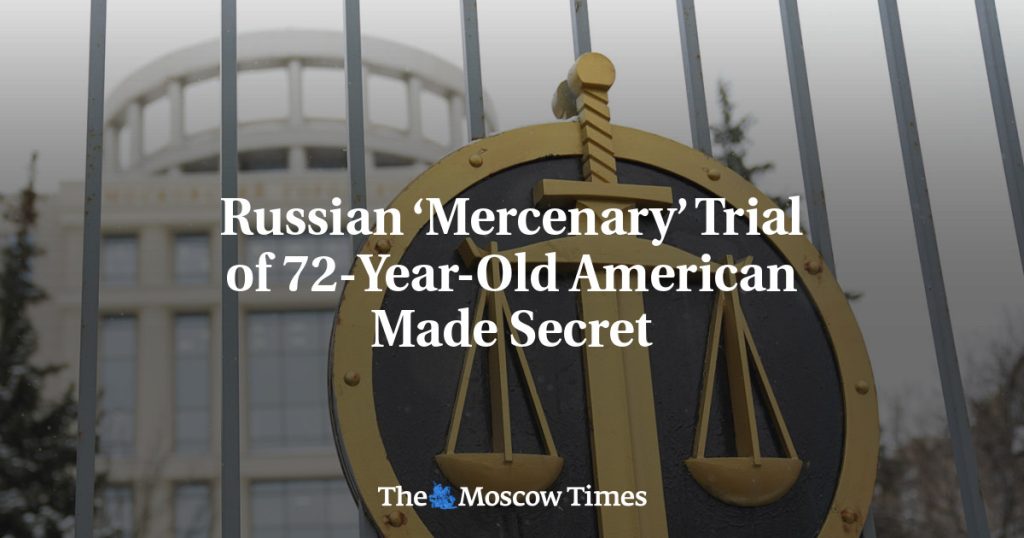A Moscow court ordered that the trial of 72-year-old U.S. citizen Stefan Hubbard, accused of fighting as a mercenary for Ukraine, proceed in secret. Hubbard, who appeared in court wearing a black hat and beige jacket, faces up to 10 years in prison for fighting on the side of Ukraine. Russian prosecutors allege that Hubbard was paid at least $1,000 per month to join a Ukrainian territorial defense unit, undergo training, wear a combat uniform, and participate in the armed conflict in Ukraine. He was captured on April 2, 2022, weeks after Russia launched its full-scale invasion. Hubbard had been living in the Ukrainian city of Izium in northeastern Kharkiv region since 2014, according to Russia’s state-run TASS news agency. Several U.S. citizens have been arrested in recent years by Russia, including Ksenia Karelina, a joint U.S.-Russian citizen sentenced to 12 years in prison for donating to a Ukrainian organization, and two Colombian citizens charged with being “mercenaries” for Ukraine.
The start of the trial saw prosecutors request that the proceedings be moved behind closed doors, a common practice for high-profile or politically sensitive trials in Russia. The defense did not contest the request, leading to journalists and U.S. embassy officials being asked to leave the courtroom. Russia’s actions towards independent journalists have escalated, with The Moscow Times being designated as an “undesirable” organization by the Prosecutor General’s Office. This move criminalizes their work and puts their staff at risk of prosecution, following an earlier labeling as a “foreign agent.” The Moscow Times continues to strive for accurate and unbiased reporting on Russia, refusing to be silenced by these attempts to suppress independent journalism. They are calling for support from readers to help continue their work and defend open journalism in the face of repression.
The case of Stefan Hubbard marks yet another instance of a U.S. citizen becoming entangled in Russia’s legal system in connection with the conflict in Ukraine. Hubbard’s alleged involvement in fighting for Ukraine against Russia highlights the complexities and geopolitical tensions surrounding the conflict. The secrecy surrounding the trial proceedings raises questions about transparency and fairness in the Russian legal system, particularly in cases involving foreign citizens. Russia’s actions towards individuals accused of supporting Ukraine, whether through financial donations or direct involvement in armed conflict, demonstrate the serious consequences faced by those caught in the middle of the ongoing conflict.
The situation surrounding Hubbard’s trial sheds light on the broader context of Russia’s actions towards individuals perceived as threats to its interests in Ukraine. The arrests of U.S. citizens and others on charges related to the conflict illustrate Russia’s efforts to control the narrative and suppress dissenting voices. The targeted suppression of independent journalism, as seen in the case of The Moscow Times, reflects a broader crackdown on freedom of expression in Russia. By supporting independent media outlets like The Moscow Times, readers can help ensure that critical reporting on Russia continues despite attempts to silence dissenting voices.
As the trial of Stefan Hubbard continues, the international community will be watching closely to see how the case unfolds and whether Hubbard receives a fair and transparent trial. The outcome of this case will have implications not only for Hubbard and other individuals facing similar charges but also for the broader relationship between Russia, Ukraine, and the United States. The ongoing conflict in Ukraine, coupled with Russia’s actions towards individuals perceived as threats, underscores the complex and volatile nature of geopolitics in the region. By supporting independent journalism and advocating for transparency and accountability in legal proceedings, readers can play a role in promoting justice and upholding human rights in the face of repression and political manipulation.


